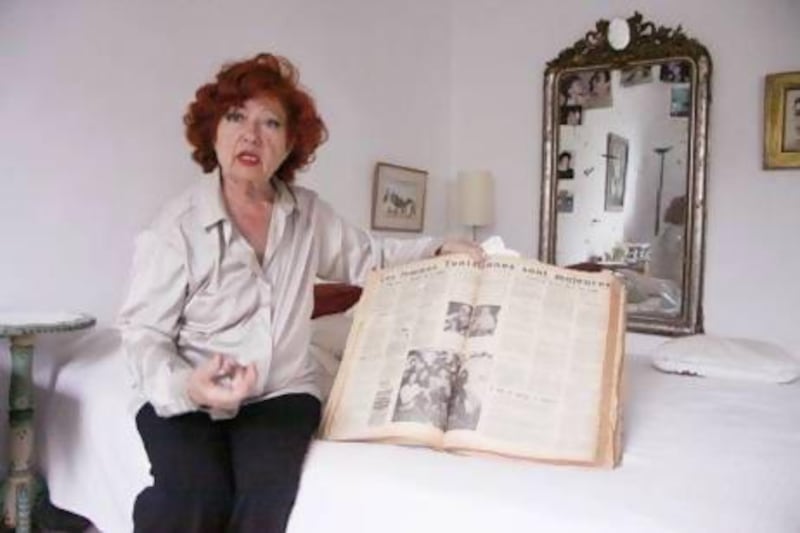Dorra Bouzid
Mrs Bouzid is a living embodiment of the Tunisian struggle for women's rights.
She began her work as an activist and journalist while a student in 1950s Paris, before her country gained independence from French colonial rule.
Writing under the pseudonym "Leila" for L'Action, a French-language Tunisian newspaper, she called for an end to what she described as a medieval attitude towards women.
Now, speaking in her flat in La Marsa, a wealthy suburb of Tunis that is home to its most liberal elite, she glows as she remembers the days when Habib Bourguiba's movement pushed the French out of power.
One of Bourguiba's first acts was to pass the Code of Personal Status, enshrining women's rights, with the blessing of imams in Tunis, which was a centre of Islamic thought on feminism before feminism existed.
"I showed that religion is not incompatible with equality," she declared, showing the double-page spread she wrote on that historic day in 1956, with a picture of the imams prominently displayed and the headline "The Tunisian women are adults".
Resplendent with red henna in her hair, fat flicks of black eyeliner and scarlet lips, Mrs Bouzid recalled the 1960s and 70s, when she trained women to be independent journalists.
"The women were more and more powerful and strong," she said. When the uprising against Zine El Abidine Ben Ali began in December 2010, she wrote articles, spoke to the international media and encouraged a downfall she hoped would lead to greater freedom of speech.
But she shakes her head when contemplating what came after.
"The government and the minister of women want to return to Sharia," she said. "And every minute, every hour, every day, the women's associations are in opposition."
Under Sharia, she said, the woman's body is not her own, she is the property of her husband or father.
However, like several other secular activists, she thought protesting by posting nude photographs on the internet was a bad idea.
"It is stupid," she said firmly. "When they do this, they don't help women's cases." Religious groups, she said, could use the image to denounce secularists as wanton, and un-Tunisian.
"There are other methods to help the situation," she added. "It's not good politics."
Samira Othmani
Mrs Othmani is in her early 50s and in the second year of her studies for a master's degree in Sharia at the Zeitouna university in the Tunisian capital.
An earnest, forthright woman, who wears a long headscarf and loose clothing, she has devoted much of her life to Islamic teachings but said that under the rule of Habib Bourguiba and, after he was removed from office in 1989, Zine Al Abidine Ben Ali, her calling was a constant struggle.
"We spent 20 years pushing people away from Islam," she said regretfully.
Participating enthusiastically in last week's World Social Forum, at which there were many workshops and political discussions advocating a strong role for Islam in politics and the lives of women, she said that now she was finally free to pursue her studies as she wished.
In 1994, she had been working as a teacher of Islamic scripture, when she was abruptly fired. She believed that it was because she wore a headscarf, in an atmosphere of deep mistrust of Islamist movements, which presented the greatest threat to the government, such religiosity was not welcome.
"I was called to police stations many times to sign an affidavit that I would never wear the scarf again," she said.
Now, she is pushing actively for the implementation of Sharia in Tunisia. Although she acknowledges that this could mean the reintroduction of some of the harsher punishments associated with some interpretations Islamic law, such as the stoning of adulterers, she chooses to focus more on the laws that "organise the relationship between the human and God, and with husband, sister and children".
On the subject of Amina Tyler's topless protest, she called for mercy, rather than arrest or punishment.
"I don't believe in punishing people," she said. "It's the fault of the previous government, because they had the western woman as the perfect model."





